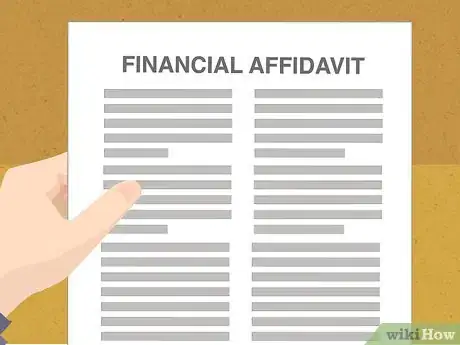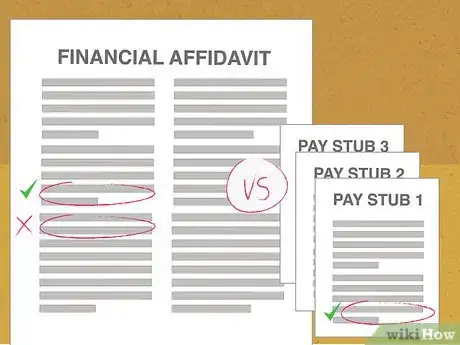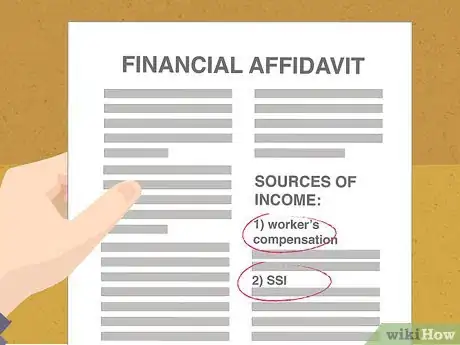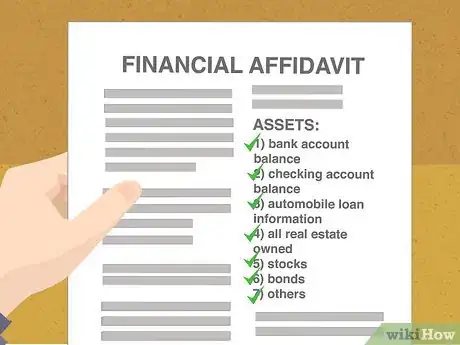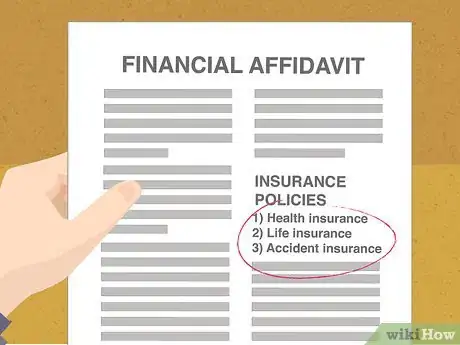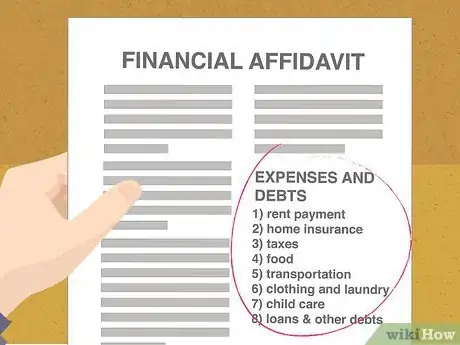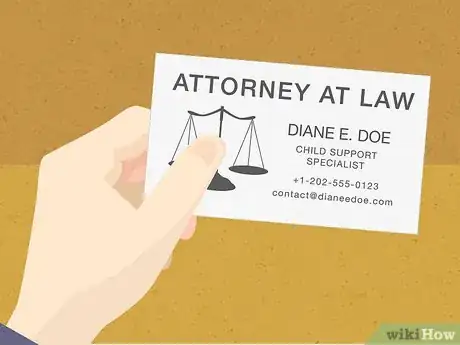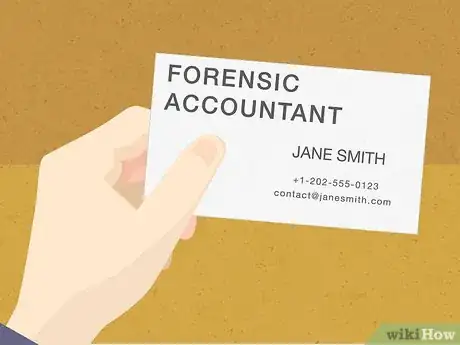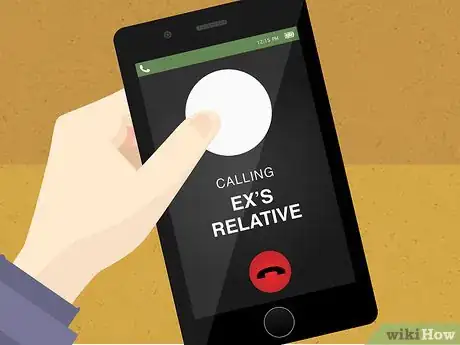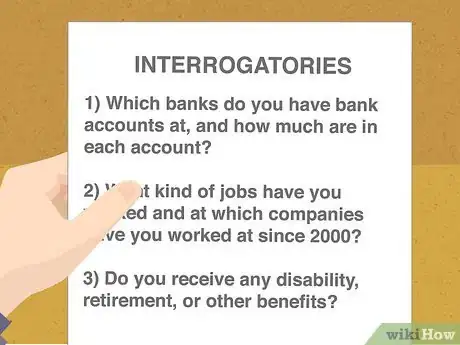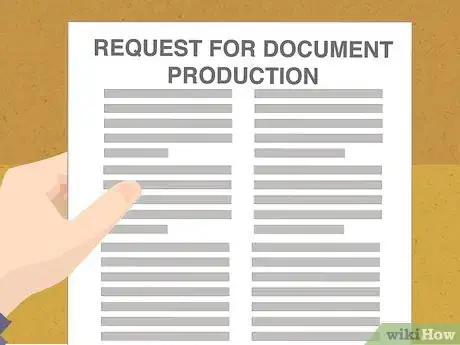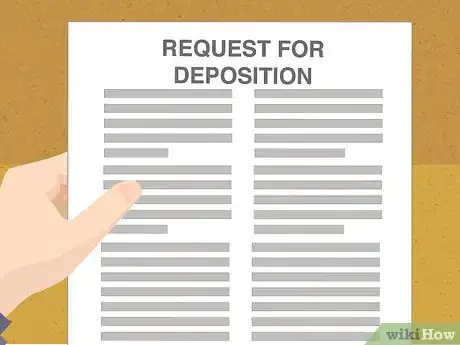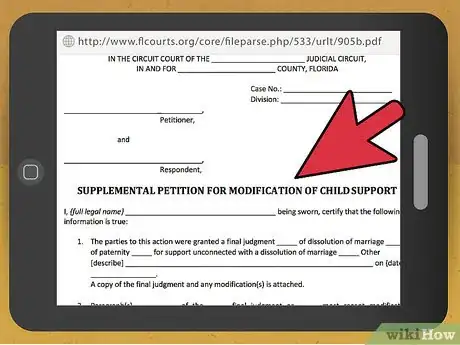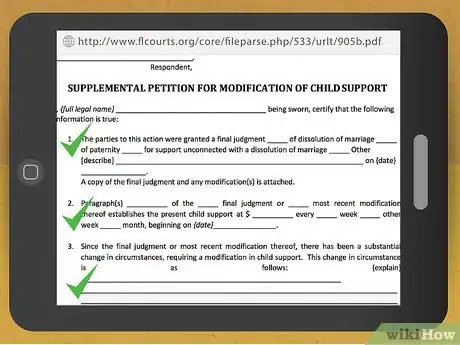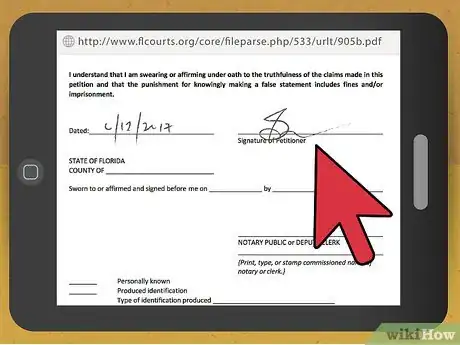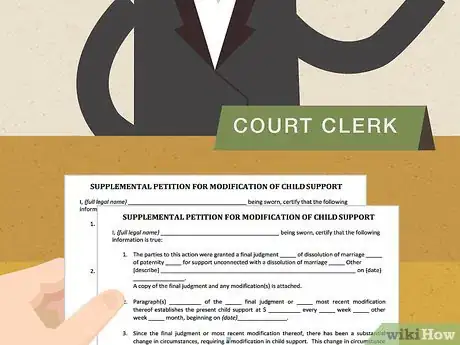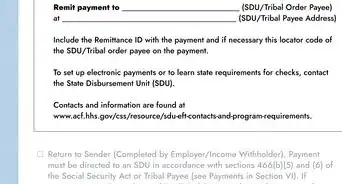This article was co-authored by Clinton M. Sandvick, JD, PhD. Clinton M. Sandvick worked as a civil litigator in California for over 7 years. He received his JD from the University of Wisconsin-Madison in 1998 and his PhD in American History from the University of Oregon in 2013.
There are 7 references cited in this article, which can be found at the bottom of the page.
This article has been viewed 57,205 times.
It is illegal to lie on a financial affidavit for child support. However, proving that your ex lied could be difficult. In particular, you will need evidence that proves your ex is lying; a mere suspicion is not enough. You will need to perform a preliminary investigation and identify what assets you think your ex has hidden or what debts they have exaggerated. You can then request documents using different “discovery” techniques.
Things You Should Know
- Find your copy of the affidavit and check it for accuracy, analyzing all of your ex’s reported income, assets, insurance, and expenses.
- Make sure you have an attorney handling your case and discuss hiring a forensic accountant if you can.
- Investigate your ex’s income; contact their family, ask for discovery, talk to your ex, serve a request for production, send subpoenas, or request a deposition.
- File a motion to modify child support by completing the form, signing it, filing it, and attending a hearing; make sure you have all your evidence in place.
Steps
Analyzing the Affidavit
-
1Find your copy. It can be difficult to “prove” that your ex has lied about his or her finances. However, before beginning, you should get your copy of the financial affidavit your ex has filed. You will need to analyze and see what income and debts your ex has reported.
- You should have been served with a copy of the affidavit.
- However, if you can't find your copy, then go to the court and ask the court clerk for a copy. Have your case number available.
-
2Check that income was reported accurately. Each affidavit should have information about your ex's wages and tips, as well as about his or her deductions for federal and state taxes.[1] Most affidavits also require that your ex provide pay stubs and other documents in support. Compare the pay stubs to the information listed on the affidavit.
- Some people might deliberately misrepresent on the affidavit how much they make or the amount of deductions, even though they provide pay stubs that disprove what they have reported.
Advertisement -
3Analyze other income reported. Generally, your ex must report all sources of income, not just wages or salary. Think back to when you were together and see if you can identify any sources of income your ex might not have reported. For example, he or she should have reported the following:[2]
- worker's compensation
- unemployment benefits
- pension or retirement benefits
- public assistance, such as food stamps
- disability benefits
- veteran's benefits
- Social Security or Supplement Security Income (SSI)
- personal injury settlements
-
4Confirm that your ex has reported all assets. The affidavit should also ask your ex to report information about assets. Look at this information closely. The affidavit should provide the following:[3]
- bank account balance and the name of the bank
- checking account balance and the name of the bank
- automobile loan information
- all real estate owned, including addresses
- stocks, bonds, and other assets
-
5Check information about insurance policies. Affidavits generally also require that you report any insurance policies they have. You should check to see if everything has been reported on the affidavit. Insurance generally includes:[4]
- Health insurance
- Life insurance
- Accident insurance
-
6Analyze whether claimed expenses are reasonable. The affidavit may also request that the parent report expenses and debts. It is fairly common for a parent to inflate how much they spend on monthly living expenses or to exaggerate their debt loads. Look at these expenses closely and flag anything that looks suspicious:[5]
- rent or mortgage payment
- home insurance
- taxes
- food
- transportation expenses
- clothing and laundry expenses
- child care
- mandatory union dues
- loans and other debts
-
7Meet with an attorney. You might be trying to get child support without an attorney. However, you really need an attorney's experience when handling child support issues. You should get a referral to an attorney by contacting your local or state bar association.
- Once you have a referral, contact the attorney and schedule a consultation. Ask how much they charge.
- At the consultation, explain why you think your ex is lying on the affidavit. Your attorney can help you come up with a plan of action.[6] Specifically, your attorney can advise you about what evidence you will need and how you can get it.
-
8Discuss hiring a forensic accountant. Your attorney might suggest that you hire a forensic accountant.[7] These accountants are skilled at analyzing complicated financial data.
- You might want a forensic accountant if your ex owns a business and is claiming high debts or very low income.
- Ask the attorney for a referral to a forensic accountant. You can then schedule a meeting with him or her to talk about your case.
Requesting Financial Documents
-
1Perform an investigation. You might suspect that your ex is hiding income, but how do you really know? One thing you can do is perform a preliminary investigation. For example, you could do the following:
- Ask friends and family if your ex is hiding assets. They might know that he or she has a summer home in another state. They also might know if your ex suddenly got a new job or inherited money from a relative. You can get more solid proof later, but friends and family can help provide you with leads.
- Talk to your ex in person. You can gain valuable insight if you speak in person. For example, confront your ex and state you think they are hiding assets. Judge their response. If your ex seems nervous, then you can suspect that they are hiding something.
- Follow your ex. You can have a friend follow your ex around and find out where he or she goes. If they go to a job or visit a bank, then you can ask about those subjects. You could also hire a private investigator.
-
2Ask for discovery. In most child support cases, you have the right to “discovery.” This process allows each side to request information from the other parent.[8] At your next court hearing, you should tell the judge you want discovery because you think your ex's affidavit is inaccurate.
- You might already have a child support order in place. Most state laws require that parents update the court when they have a change of income. In this situation, you should call your state's child support agency and talk to your case worker. Tell him or her that you suspect your ex has failed to report changes to their financial situation.
-
3Send interrogatories for your ex to answer. One discovery technique is to send written questions to your ex, which he or she must answer under oath. These written questions are called “interrogatories.”[9] You might use interrogatories to find out various financial information:
- Where your ex has bank accounts.
- The jobs your ex has worked over the past few years.
- Any disability, retirement, or other benefit your ex receives.
-
4Serve a Request for Production. Another discovery technique is to request copies of documents from your ex. You can generally request anything that might be relevant to checking whether the financial affidavit is accurate. For example, you should request the following:[10]
- updated bank statements
- W-2 forms
- tax return information
- business records (if self-employed)
- information on debts, such as credit card statements or other debt statements
- loan applications
-
5Send subpoenas to financial institutions. You might serve your ex with Requests for Production and interrogatories. However, he or she could still lie and withhold information. Your next step could be to request documents directly from financial institutions like banks. You should think about using subpoenas if you think your ex didn't turn over all relevant documents after receiving a Request for Production.[11]
- You should get a subpoena form from the court clerk. Tell the court clerk what kind of document you are requesting and ask for the right subpoena form.
-
6Request that your ex sit for a deposition. Depositions are another discovery technique. In a deposition, you can ask your ex questions in person, which he or she must answer under oath. Depositions are helpful because you can ask follow-up questions. A court reporter will take down the questions and answers.[12]
- Depositions are complicated, and you probably need a lawyer to conduct one. The purpose of the deposition will be to uncover hidden assets your ex might have failed to report.
- See Prepare for a Deposition for more information.
Filing a Motion to Modify Child Support
-
1Get a form. If a child support order is already in place, then you should file a “motion” to change the child support amount. Your court should have a printed, “fill in the blank” motion that you can use. Ask the clerk.[13]
- If you don't yet have a final child support order in place, then you don't need to file a motion. Instead, you will ask the judge for a hearing on whether the information in your ex's affidavit is accurate.
-
2Complete the form. Each state's form is different, but they generally will require that you provide similar information about the case. For example, you will probably have to provide the following:[14]
- Background information, such as when the initial child support order was entered.
- How circumstances have changed. The form might provide space for you to explain why you are requesting a modification in child support. You should explain why you suspect that your ex has lied about his or her assets.
- How much you want to pay in child support. You may have to fill out a “worksheet” to calculate the amount of child support. Ask the court clerk for the worksheet.
-
3Sign the form under penalty of perjury. Most forms require that you sign under penalty of perjury, so make sure that the information in the motion is accurate to the best of your knowledge.
- You also might have to sign the form in front of a notary public.[15]
- You can find a notary at the courthouse, town office, or at most large banks. Be sure to take sufficient personal identification, such as a valid state-issued ID or passport.
-
4File your forms. Make two copies—one for your records and one for your ex. Take the copies and the original to the court clerk. Ask to file the original.[16] You probably have to schedule a hearing at the same time.
- Make sure to serve the other parent a copy of your form. Generally, you can have it hand delivered or mailed.
-
5Attend a hearing. Before the hearing, you should get your witnesses and evidence lined up. To prove that your ex lied on the affidavit, you need to gather helpful information that you might have uncovered during discovery. You will have to confront your ex with this evidence. For example, you might have the following:
- If your ex has a new job, then you can have a coworker testify.
- If your subpoena uncovered hidden bank accounts or assets, then you should introduce bank documents that prove this.
- If you have pictures of assets—such as cars, boats, or homes—then you should introduce them as well. Call whoever took the pictures as a witness. If you did, then you will need to testify as to the date and time that you took the pictures.
References
- ↑ https://www.nycourts.gov/LegacyPDFS/courts/6jd/forms/Local/Family/FinanDisclosAffidavit.pdf
- ↑ https://www.nycourts.gov/LegacyPDFS/courts/6jd/forms/Local/Family/FinanDisclosAffidavit.pdf
- ↑ https://www.nycourts.gov/LegacyPDFS/courts/6jd/forms/Local/Family/FinanDisclosAffidavit.pdf
- ↑ https://www.nycourts.gov/LegacyPDFS/courts/6jd/forms/Local/Family/FinanDisclosAffidavit.pdf
- ↑ https://www.nycourts.gov/LegacyPDFS/courts/6jd/forms/Local/Family/FinanDisclosAffidavit.pdf
- ↑ http://farzadlaw.com/california-family-law/lying-income-expense-declaration-instructions/
- ↑ http://farzadlaw.com/california-family-law/lying-income-expense-declaration-instructions/
- ↑ http://farzadlaw.com/california-family-law/lying-income-expense-declaration-instructions/
- ↑ http://blogs.findlaw.com/law_and_life/2014/02/what-to-do-if-ex-spouse-lies-about-finances.html
- ↑ http://blogs.findlaw.com/law_and_life/2014/02/what-to-do-if-ex-spouse-lies-about-finances.html
- ↑ http://farzadlaw.com/california-family-law/lying-income-expense-declaration-instructions/
- ↑ http://litigation.findlaw.com/filing-a-lawsuit/what-is-a-deposition.html
- ↑ http://www.flcourts.org/core/fileparse.php/533/urlt/905b.pdf
- ↑ http://www.flcourts.org/core/fileparse.php/533/urlt/905b.pdf
- ↑ https://www.superiorcourt.maricopa.gov/sscDocs/packets/drmss1fz.pdf
- ↑ http://www.flcourts.org/core/fileparse.php/533/urlt/905b.pdf
